

Dove Onslaught(er) Greenpeace - kitkat - Ask Nestlé CEO to stop buying palm oil from destroyed rainforest. Palm oil. Palm Oil and How it threatens Orangutans. Palm oil is derived from the fruit of the oil palm tree.
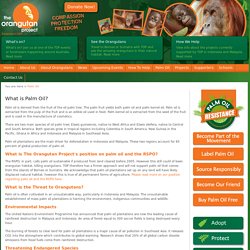
The palm fruit yields both palm oil and palm kernel oil. Palm oil is extracted from the pulp of the fruit and is an edible oil used in food. Palm kernel oil is extracted from the seed of the fruit and is used in the manufacture of cosmetics. There are two main species of oil palm tree; Elaeis guineensis, native to West Africa and Elaeis oleifera, native to Central and South America. Both species grow in tropical regions including Colombia in South America, New Guinea in the Pacific, Ghana in Africa and Indonesia and Malaysia in Southeast Asiia.
Say No To Palm Oil. Certified Sustainable Palm Oil (CSPO) CSPO represents the certification process where palm oil growers must commit to real credible sustainability standards through time-bound plans.
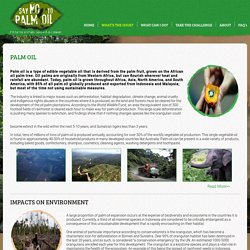
There is an increasing demand for palm oil that is sustainably certified in Europe and North America, including big names such as Walmart, Unilever and Nestle. As of 2011, CSPO represented over 10% of the global palm oil market but this has increased in recent years and is projected to increase in coming years. The certification process consists of reviewing existing production operations and identifying areas that must be improved to reach the CSPO standards to then be approved by a certification body. The standards are based on eight principles which have been retrieved from the RSPO website: 1. 2. 3. 4. 5. INFOGRAPHIC: Are YOU connected to rainforest destruction? & Rainforest Action Network Blog. Palm Oil’s Dirty Secret: The Many Ingredient Names For Palm Oil. Click to view full-size infographic Did you see the palm oil infographic we released today?
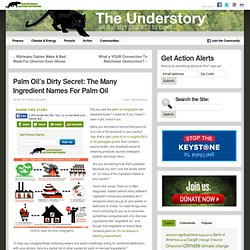
I hope so! If you haven’t seen it yet, check it out. Were you shocked to find out that palm oil is in half of the products in your pantry? Yep, that’s right, palm oil is in roughly 50% of all packaged goods, from cookies, peanut butter, and breakfast cereal to cleaning products, laundry detergent, lipstick, and body lotion. Are you wondering how that’s possible, because you don’t see the words “palm oil” on many of the ingredient labels in your pantry? Here’s the scoop: Palm oil is often disguised, hidden behind many different ingredient names you probably don’t recognize when you go to your pantry or bathroom to check.
To help you navigate these confusing waters and avoid unwittingly voting for rainforest destruction with your dollars, here is a partial list of other names for palm oil-derived ingredients:* Palm oil. Huile de palme : Danger ! L'huile de Palme est la moins chère du monde.
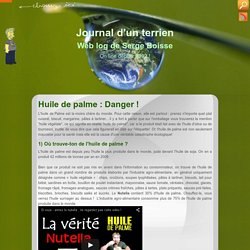
Pour cette raison, elle est partout : prenez n'importe quel plat cuisiné, biscuit, margarine, pâtes à tartiner... il y a fort à parier que sur l'emballage vous trouverez la mention "huile végétale", ce qui signifie en réalité 'huile de palme", car si le produit était fait avec de l'huile d'olive ou de tournesol, inutile de vous dire que cela figurerait en clair sur l'étiquette! Or l'huile de palme est non seulement mauvaise pour la santé mais elle est la cause d'une véritable catastrophe écologique! Éléphants empoisonnés pour l'huile de palme. Avec sa trompe, un éléphanteau tente en vain de réanimer sa mère gisant sur le sol.
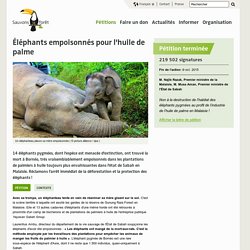
C'est la scène terrible à laquelle ont assité les gardes de la réserve de Gunung Rara Forest en Malaisie. Elle et 13 autres cadavres d'éléphants d'une même horde ont été retrouvés à proximité d'un camp de bûcherons et de plantations de palmiers à huile de l'entreprise publique Yayasan Sabah Group. Homeless Orangutan Signs Heart-Breaking Message About Palm Oil. 'Palmed Off': Is Your Dinner Killing Orangutans? When I found Max, he couldn’t walk.
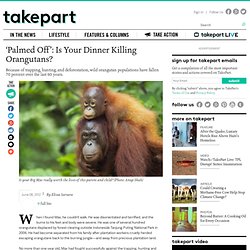
He was disorientated and terrified, and the burns to his feet and body were severe. He was one of several hundred orangutans displaced by forest clearing outside Indonesia’s Tanjung Puting National Park in 2006. He had become separated from his family after plantation workers cruelly herded escaping orangutans back to the burning jungle—and away from precious plantation land. No more than one year old, Max had fought successfully against the trapping, hunting and forest clearing industries that endangered his short life.
But with one last breath, he finally lost his battle, becoming one of several thousand orangutans killed annually by a barbaric agricultural farming process, and becoming a victim of a different kind of oil spill: the trade in palm oil. Palm oil monoculture is “palming” off orangutans in giant numbers, pushing the once abundant species closer than ever to extinction. These same scientists predict the species could be extinct by 2023. Controversial News, Controversial Current Events. Author: Lou A, March 31, 2013.

English: Palm oil from Ghana with its natural dark color visible, 2 litres Español: Aceite de palma de Ghana con su color oscuro natural, 2 litros (Photo credit: Wikipedia) [Note: images in this article are disturbing] Are you guilty? I’m definitely an animal lover, but not an extreme animal activist: I am not vegan, nor vegetarian (aside from a brief dalliance as a child after watching ‘Babe’, proudly, for around a year and a half) as I love meat too much (and yes, I confess I was broken by a BigMac….), and I wear leather (perhaps naively assuming this is a by product of the red meat I’m eating), but I AM in favour of sustainable and cruelty free products.
I do not support the fur trade, which I think is a diabolical excuse for fashion, nor do I buy eggs that are from battery hens. Do you eat biscuits? Do I sound like I’m overexaggerating? Life Without Palm Oil. Case against Palm Oil. Tell the Snack Food 20: Don't Replace Trans Fats with Conflict Palm Oil. VIDEO: Say no to dirty palm oil.
Palm oil is a staple food for millions of people worldwide, and it is an ingredient or component of 50% of packaged consumer products, from chocolate, to biodiesel, to shampoo.
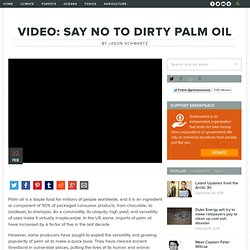
As a commodity, its ubiquity, high yield, and versatility of uses make it virtually irreplaceable. In the US alone, imports of palm oil have increased by a factor of five in the last decade. However, some producers have sought to exploit the versatility and growing popularity of palm oil to make a quick buck. They have cleared ancient forestland in vulnerable places, putting the lives of its human and animal inhabitants at risk. And they have done it to disastrous results.